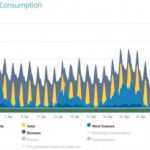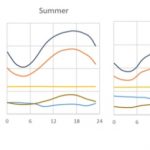Russia normally exports 5m barrels of oil a day. Sanctions may now see Ukraine-supporting nations refuse to buy 3m of them. Can those nations cut their consumption by the same amount, immediately, and stop shortages and further price rises? Yes, says Lucas Davis at the Haas School of Business. Following the Russia-Ukraine crisis, the IEA has released a report “A 10-Point Plan to Cut Oil Use”, with ten ideas for immediate actions in advanced … [Read more...]
Behaviour Change: strategies and case studies for reaching net-zero by 2050
Technological solutions on their own are unlikely to deliver emissions reductions at the speed and scale required to reach net zero by 2050. Daniel Crow, Insa Handschuch, Gabriel Saive and Leonie Staas at the IEA look at a suite of policy-driven citizen “behaviour changes” that should be used to bridge the gap. The impact will be greatest in advanced economies where energy intensity is highest. Meanwhile, in emerging economies the good habits put … [Read more...]
Electric Micromobility: how to cut emissions, create jobs and transform urban transport
What if e-bikes, electric scooters and electric skateboards were added to walking and cycling in our attempts to reduce emissions through behaviour change? It’s a promising solution for all those people who genuinely want to reduce their emissions but don’t want the extra exercise. Quoting from their report, Jennifer Dungs at EIT InnoEnergy looks at the gains to be made, along with a valuable reduction in city congestion. Micromobility is still … [Read more...]
Negative electricity prices: lockdown’s demand slump exposes inflexibility of German power
The lockdown has unexpectedly allowed us to model certain aspects of the energy sector’s possible future. One is the oversupply of variable renewables into the grid. In Germany, a slump in demand plus an exceptionally sunny and windy few months sent wholesale electricity prices negative and to record lows. Fossil generators calculated that paying buyers to take electricity was cheaper than performing a shut-down re-start sequence, so they did … [Read more...]
Don’t blame Wind, Solar for Coal cycling. It’s everyday variable demand
Joseph Daniel at the Union of Concerned Scientists explains why variable renewables like wind and solar are not forcing coal plants to cycle (ramp up and down). He presents data from the U.S. that clearly shows it’s straightforward variable demand that’s doing it, because demand has always varied considerably throughout the day. So stop blaming the arrival and growth of wind and solar for this “inefficiency”, he says. These renewables have plenty … [Read more...]






